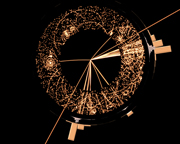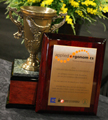


Beginning Monday, March 29, and continuing through the night and next morning, scientists at CERN in Switzerland labored to bring the counter-rotating proton beams in the Large Hadron Collider (LHC) together, finally achieving record-breaking seven trillion electron-volt collisions at six minutes after one o'clock, Central European time, marking the beginning of the long-awaited LHC physics research program. Berkeley Lab is a major participant in several aspects of the LHC including the ATLAS experiment, which is running videos of the first collision events and continually updated blogs. Read more details from CERN and the US LHC collaboration.
 The Molecular Foundry's Jim DeYoreo has received the 2010 Laudise Prize for his contributions to the "technology and scientific basis of rapid growth of perfect crystals from solutions." Awarded every three years by the International Organization for Crystal Growth, the Laudise Prize honors significant technological achievements in the field of crystal growth, and is named for Robert A. Laudise, who pioneered the growth of defect-free quartz crystals used in everything from timepieces to telecommunications. DeYoreo and his collaborators from Livermore Lab and Moscow State University will collect their award in Bejing this August at the International Conference on Crystal Growth. More>
The Molecular Foundry's Jim DeYoreo has received the 2010 Laudise Prize for his contributions to the "technology and scientific basis of rapid growth of perfect crystals from solutions." Awarded every three years by the International Organization for Crystal Growth, the Laudise Prize honors significant technological achievements in the field of crystal growth, and is named for Robert A. Laudise, who pioneered the growth of defect-free quartz crystals used in everything from timepieces to telecommunications. DeYoreo and his collaborators from Livermore Lab and Moscow State University will collect their award in Bejing this August at the International Conference on Crystal Growth. More>
The University of California Post-Employment Benefits Task force will present possible pension and health benefit recommendations and the results of a recent employee survey at a forum at Berkeley Lab on Wednesday, April 28, from 10 a.m. to noon in the Building 50 Auditorium. This presentation will also be available via a live webcast for those unable to attend. This is a follow-up meeting to the task force's first presentation last fall. Go here for more information on the Post-Employment Task Force, including a recording of the fall forums. More>
Today and tomorrow are the last days for selecting undergraduate interns for this summer through the Center for Science and Engineering Education (CSEE) programs funded by the Department of Energy. Partial or full support is available for many of these students. Potential mentors with projects for an intern should view mentoring guidelines and contact CSEE immediately.
 The Joint Genome Institute now has a matched pair of Ergo Cups after winning at the 13th Annual Applied Ergonomics Conference held last week in San Antonio, Texas. The Ergo Cup highlights ergonomic innovations from institutions and multinational corporations and the JGI’s winning entry in the Ergonomic Program Improvement Initiatives category focused on employee-driven elements of the JGI program that both encourage employee involvement and help promote awareness of ergonomics and safety. The DOE JGI won the 2007 Ergo Cup for its team-driven workplace solutions category entry, the "Shake ‘N Plate instrument."
The Joint Genome Institute now has a matched pair of Ergo Cups after winning at the 13th Annual Applied Ergonomics Conference held last week in San Antonio, Texas. The Ergo Cup highlights ergonomic innovations from institutions and multinational corporations and the JGI’s winning entry in the Ergonomic Program Improvement Initiatives category focused on employee-driven elements of the JGI program that both encourage employee involvement and help promote awareness of ergonomics and safety. The DOE JGI won the 2007 Ergo Cup for its team-driven workplace solutions category entry, the "Shake ‘N Plate instrument."
 Employee Activity: Zumba Classes Restart; Take Place on Thursdays
Employee Activity: Zumba Classes Restart; Take Place on ThursdaysZumba classes will be offered free in Building 76-235 at noon on Thursdays. Zumba is a Latin-inspired fitness dance class that is becoming immensely popular (currently taught at 50,000 locations in 75 countries). It features fun, easy-to-follow dance moves to Merengue, Salsa, Cumbia, Reggaeton, Samba, Cha-Cha, belly dance, hip-hop, and many other styles of music. Bring a towel, water, and comfortable clothing. Contact Jeff Philliber (x5257) for more information.
Today at Berkeley Lab encourages comments, suggestions, and story ideas. Please send them here.
TABL is produced by Public Affairs' Communications Group